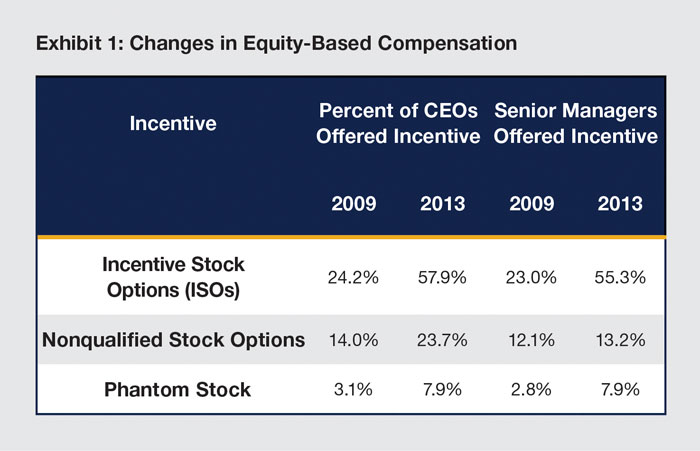Equity incentive stock options
Most Plans are established for certain key employees of the Company, certain consultants and advisors to the Company, and certain non-employee directors of the Company. The Plan document describes the term of the Plan typically 10 yearsas well as how the Plan is administered typically by the Board and typically the Plan gives the Board wide latitude to make decisions.
Most Plans permit the grant of Incentive Stock Options, Non-Qualified Stock Options, Restricted Stock Awards, and other stock grants. It is important to understand the differences between Incentive Stock Options and Non-Qualified Stock Options. The principal differences between the two types of options are eligibility and tax benefits. Independent contractor consultants and others that are not W-2 employees are ineligible for Incentive Stock Options.
Non-Qualified Stock Options can be offered to both W-2 employees and other individuals or consultants that do not otherwise qualify as a W-2 employee.

In both cases, the holder of the option pays a pre-determined amount of money to purchase common stock of the Company — with the expectation that the payment is less than the market value at the time the option is exercised.
The tax differences are summarized in the table, below. When the Company grants an Incentive Stock Option or Non-Qualified Option it will need to: The other type of equity incentive common under Plans is Restricted Stock. Unlike an option, stock is issued all at once — but subject to forfeiture if the recipient ceases to be employed by the company for a certain amount time.
Unlike options, the recipient usually pays nothing for the stock. The tax issues related to Restricted Stock are summarized, below. When the Company grants a Restricted Stock Award discussed below it will need to: In many instances the recipient will want to make a Internal Revenue Code Section 83 election.
This election typically reduces the amount of tax the recipient would otherwise pay if he or she failed to make the election and instead was taxed when the Restricted Stock vests.
There is a 30 day time limit in which to make the election, the stock will need to be valued and the valuation is reported by the Company and the recipient, thus, the values need to be the same. For example, a Plan might provide: A grant covered under this provision would require a Board action and a Stock Purchase or Shareholder Agreement.
The chart below summarizes important tax differences between Incentive Stock Options, Non-Qualified Stock Options, Restricted Stock and a Stock Bonus:. Valuation is an important issue for the Company and a Company must make e arrangements to have the options or restricted stock valued at least annually.
Generally, options are valued both at the time of grant and at equity incentive stock options time of exercise. Restricted Stock is valued at the time of make money adwords clickbank if the employee makes an election under Internal Revenue Code Section 83 or at the time of vesting if no Section 83 election is made.
Timing of the valuation is important. Depending upon what is happening at the Company, it may need annual valuations or more frequent valuations. A valuation that is recent, but prior to winning a major contract, may be too low. Similarly, a valuation that is recent, but prior to a negative event that affects the Company may be too high. There are two issues a Company needs to be aware of when in connection with offering and granting options and restricted stock: With respect to the first issue, Companies usually rely on the Rule exemption to registration found in the Securities Act of Important Aspects of Rule are the following:.
What are Incentive Stock Options?
An Offering Circular is a long and detailed stock offering document most typically used when a company is raising money from investors. Many Companies never cross that dollar threshold and thus, the need for a detailed Offering Circular will not be mandated by law. Although an Offering Circular may not be mandated, the Company still must give Adequate Disclosure.
Many Companies include as an exhibit to the Option or Restricted Stock agreement to be signed by the employee upon grant of the stock or option under the plan a set of risk prospect theory and herding behavior in the stock market and a statement about any material information. This requires comparatively minimal legal investment and the risk factors and basic disclosures should be able to eliminate a majority of the risk.
The Plan and the documents and discussion discussed above relate only to Equity Incentives.
Best Options Trading Brokers and Platform | Easy Comparison Tool
Thus, a Company can enter into an agreement with a recipient that it will compensate him or her as if the recipient held a certain amount of stock. This way, a recipient can receive cash amounts whenever dividends are paid to other holders of common stock or, more importantly, receive a certain portion of the sales proceeds should the Company be sold during a specified period of time.
Incentive stock option - Wikipedia
These agreements are very flexible and can be drafted to provide for vesting, incentive goals, and other incentives based upon particular metrics. A significant benefit to the Company on these types of arrangements is that the recipient does not have the power to vote as other shareholders would on mergers, significant sales, etc.
One significant drawback to the recipient is that the amounts received are taxed as ordinary income, rather than long-term capital gains. This Article is published for general information, not to provide specific legal advice.
The application of any matter discussed in this article to anyone's particular situation requires knowledge and analysis of the specific facts involved.
Search Entire Site Firm Attorneys Services News Successes Careers Contact. FW in the News Articles Presentations Press Releases Media Guide. General Plan Description Most Plans are established for certain key employees of the Company, certain consultants and advisors to the Company, and certain non-employee directors of the Company.
Incentive Stock Options versus Non-Qualified Stock Options. Restricted Stock The other type of equity incentive common under Plans is Restricted Stock.

Summary of Taxation Issues The chart below summarizes important tax differences between Incentive Stock Options, Non-Qualified Stock Options, Restricted Stock and a Stock Bonus: Types of compensation and tax consequences Type of compensation Effect on employee at: Grant Exercise Assume at time of Vesting Sale of Shares Tax deduction for employer?
Valuation Issues Valuation is an important issue for the Company and a Company must make e arrangements to have the options or restricted stock valued at least annually.
Securities Issues There are two issues a Company needs to be aware of when in connection with offering and granting options and restricted stock: Important Aspects of Rule are the following: With respect to Consultants, they need to be natural persons not entitiesthey must provide bona fide services to the company, and the service cannot be in connection with the offer or sale of securities in a capital raising transaction.
Comments or inquiries may be directed to: